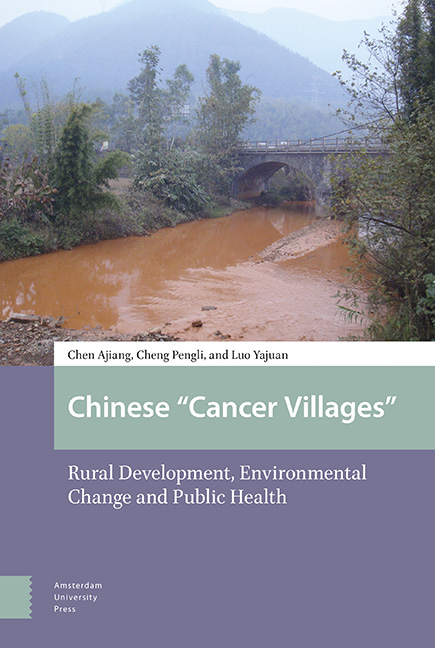Book contents
- Frontmatter
- Contents
- List of Figures, Graphs and Tables
- Acknowledgements
- Preface to the English Language Edition
- 1 Retrospective Thoughts on the ‘Cancer Village’ Phenomenon
- 2 The Ins and Outs of a ‘Cancer Village’
- 3 A Subei ‘Cancer Village’
- 4 Environmental Change and Health Risks
- 5 A Prosperous ‘Cancer Village’
- 6 Coexistence of Poverty and Cancer
- 7 Problematization and De-stigmatization
- 8 Behind the ‘High Incidence of Lung Cancer’
- 9 Villagers’ Perceptions of and Responses to the Relationship between Cancer and Pollution
- 10 Villagers Strategies for Mitigating Environmental Health Risks
- Index
- Index (Chinese) 中文索引
6 - Coexistence of Poverty and Cancer
Published online by Cambridge University Press: 20 November 2020
- Frontmatter
- Contents
- List of Figures, Graphs and Tables
- Acknowledgements
- Preface to the English Language Edition
- 1 Retrospective Thoughts on the ‘Cancer Village’ Phenomenon
- 2 The Ins and Outs of a ‘Cancer Village’
- 3 A Subei ‘Cancer Village’
- 4 Environmental Change and Health Risks
- 5 A Prosperous ‘Cancer Village’
- 6 Coexistence of Poverty and Cancer
- 7 Problematization and De-stigmatization
- 8 Behind the ‘High Incidence of Lung Cancer’
- 9 Villagers’ Perceptions of and Responses to the Relationship between Cancer and Pollution
- 10 Villagers Strategies for Mitigating Environmental Health Risks
- Index
- Index (Chinese) 中文索引
Summary
Abstract
In some relatively undeveloped rural areas of China, cancer is deeply entangled with poverty and other social problems. This study discusses a state-owned farm in Jiangxi, where residents believed that cancer was caused by pollution from a local glass factory and phosphorus fertilizer plant. Our analysis of what the villagers considered ‘iron proof’ could not confirm an association between cancer and pollution from existing industries, but despite this, residents took their evidence and petitioned various levels of government. Their persistence was fuelled by their resentment of their relative disadvantage in relation to surrounding villages and their desire to get the government to improve their water supply. The case illustrates how different social problems become ‘bundled,’ and how emotions shape perceptions of risk.
Keywords: rural pollution, water monitoring, risk perception, expert knowledge, social structure, interest groups
Environmental pollution, cancer, and the relationship between them usually fall within the purview of natural science research; but if we look at them within the context of the affected communities, they often become complex social issues. Trends in current research therefore emphasize collaboration between the natural and social sciences in the hope of finding a way to analyse and solve these problems.
Through fieldwork in multiple ‘cancer villages’, we found that when people feel the incidence of cancer and mortality in their community is high compared to the past or to other communities, and they are unable to find an exact cause, they tend to associate the problem with environmental pollution, and engage in environmental resistance to seek a solution. Because cancer has a high mortality rate, people are very afraid of it, and this, combined with weak regulation of pollution by local government, means they feel environmental protest is justified. At the same time, the relationship between pollution and cancer is extremely complex, and determining a causal relationship between the two is often very difficult. In this situation, the demands residents make of local government and polluting enterprises to solve pollution and reduce the incidence of cancer are often mixed up with their other interests, such as improving living standards or securing other economic benefits. In this situation it is very important for researchers to clarify the real interests that lie behind residents’ environmental resistance, in order to avoid being swayed by the emotions of those involved and losing objectivity.
- Type
- Chapter
- Information
- 'Chinese Cancer Villages'Rural Development, Environmental Change and Public Health, pp. 187 - 208Publisher: Amsterdam University PressPrint publication year: 2020



